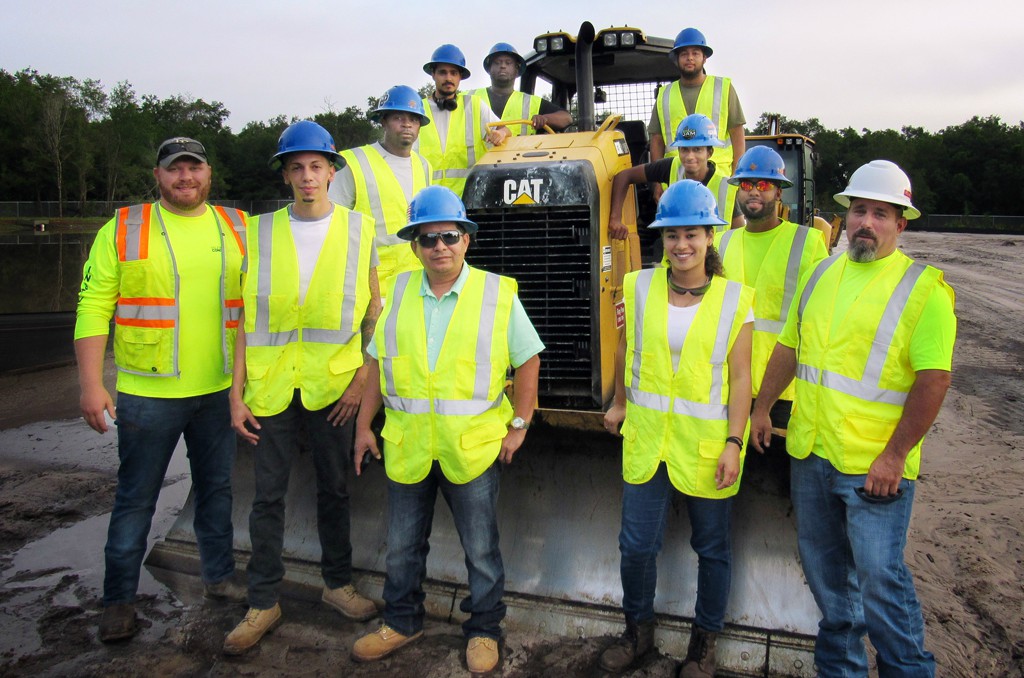Kissimmee, FL — Michael Formenta spent the last four years working as a sign spinner — and made the most of his opportunities — but he knew it was a dead-end job.
“I started out at $10 an hour but it was kind of a crappy job so, just to have fun with it, I taught myself how to dance — using YouTube videos,” says Formenta. Eventually, he had companies bidding for his services and paying him up to $15 an hour.
Still, it’s hard to make a steady living as a sign-spinner, so when Formenta, 26, heard that Valencia College was offering a nine-week program to teach beginners how to drive and operate heavy construction equipment, he signed up.
“It was a chance and I took it,” said Formenta, who graduated this week, along with the other eight students in the pilot program.
Since May, Formenta and his classmates have spent 324 hours in the training program, learning how to drive and maneuver bulldozers, front-end loaders, articulated trucks and excavators — all skills needed on construction sites, land development sites and infrastructure projects.
The students start work in the classroom, where they learn how to read blueprints and learn about civil engineering basics, including soils and paving. Then they move on to high-tech construction simulators, before they then get to operate “the iron” (heavy equipment), which includes articulated (dump) trucks, bulldozers, front-end loaders, backhoes and excavators. Each student experiences 160 hours of “seat time” on simulators and construction equipment.
https://youtu.be/A0BrmyQnHaM
Upon graduation, students will have earned a Core certification and level 1 certification on heavy equipment from NCCER (National Center for Construction Education and Research).
At the July 25 graduation ceremony, Javier Rojas, manager of Valencia’s construction programs congratulated the program’s first graduates. “You have acquired the knowledge and skills necessary to navigate into and through the construction trades industry. You are the inaugural class, the trailblazers,” he said. “You are the earth movers and shakers; your tools are the machines you operate; your success is before you.”
The nine-week program costs $6,950, but financial aid may be available to those who qualify. After completing the course, graduates are expected to earn $13 to $18 an hour, with opportunities for advancement — because they know how to operate many types of construction equipment.
For students, including William Bostic of Kissimmee, the training means a chance to advance in the construction field. “I have worked in construction before,” said Bostic, 26, “but I didn’t want to continue working with a shovel at $10 an hour.” Bostic, who says he’s “really excited” about his job prospects, said the course was interesting. “I like the whole program,” said Bostic. “The way Valencia set it up is great. I love the program.”
With more than $9 billion worth of construction projects planned for the Central Florida area over the next few years, the demand for skilled construction workers is high, and graduates of this program have the potential to earn high wages and good benefits.
Valencia anticipates training 40 students per year and, given the demand for construction workers, college officials anticipate that every graduate will land a job. Already, the following companies are interviewing the graduates: Lane Construction, Hubbard Construction, Junior Davis Construction, Prime Construction, FDOT and Orange County government.
Mark Hughes, a former coal miner and construction worker, serves as the lead instructor. “Most of (the students) have never been on any equipment,” he said. “To see how far they’ve come is very exciting. ” And, because the students have been trained on four types of equipment, they’ll be valuable employees. “Any job site you go to in Florida, you’ll see these pieces of equipment,” said Hughes. “And even though NCCR certification doesn’t include bulldozers and excavators, our students learn how to operate them.”
To create the program, Valencia partnered with a number of industry leaders and community organizations, including: JR Davis Construction (hiring partnership, preparation of operating practice area, curriculum development, site tours); CAT Simulators (partner pricing on CAT simulators, operator program marketing); Ring Power Corporation (site tours, safety training, personal protective equipment, special pricing on equipment rental); Lane Construction (curriculum sponsorship); CareerSource Central Florida (tuition funding) and Valencia College Foundation (scholarships).
The first class of graduates includes: William Bostic, Michael Formenta, José Garcia, Devon M. Martinez, Omari Robinson, Nathan N. Rodriguez, Nathaniel Sanchez, William Stephens and Gabriela Tapia.
Click here for more information about Valencia’s Heavy Equipment Construction Operators Course.
